10 Cool Ways Companies Are Innovating In Health-Care IoT
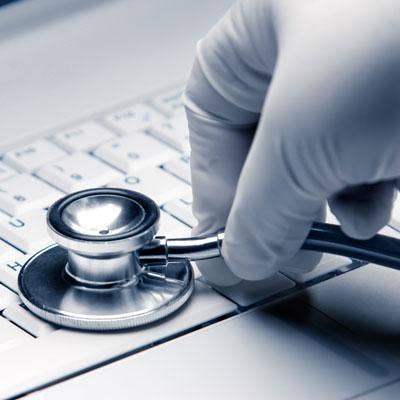
What's The Future Of Medical Tech?
The health-care vertical is one of the key markets where the Internet of Things is expected to have the greatest impact. IoT solutions in the medical field are primarily aimed at integrating connected medical devices and analyzing data to enhance the operations behind health-care organizations.
According to market research firm Markets and Markets, the global IoT health-care market will grow at a compound annual growth rate of 38.1 percent to $163.2 billion in 2020.
Solution providers, for their part, play an important part in deploying Internet of Things solutions in the health-care vertical with their knowledge of the industry's challenges and compliancy regulations. For solution providers interested in deploying IoT solutions in the medical industry, following are 10 examples of how IoT is changing the market.
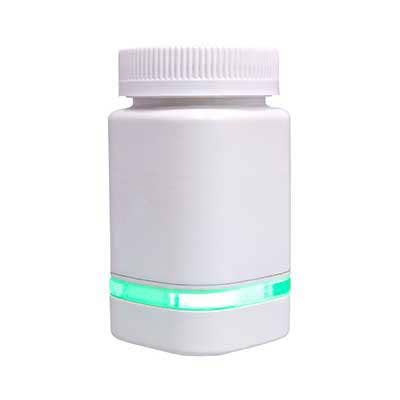
AdhereTech
AdhereTech's solution works to solve a common challenge in the health-care industry – adherence tools are often difficult for patients to set up and they require complicated workflows.
The New York-based company makes smart wireless pill bottles, which are rechargeable and last up to five years, that collect and send adherence data in real-time. So, if patients miss doses, they will receive customizable alerts and interventions (through automated phone calls and text messages).
This smart pill bottle is also compliant with HIPAA, FDA and CE regulations, according to AdhereTech.

Stanley Healthcare
Stanley Healthcare has several Internet of Things applications in the health-care space, but one of its more prominent ones involves tracking patient flow and staff workflow in hospitals.
The company's AeroScout Real-Time Location System platform gives hospitals visibility into the status and location of patients, staff and equipment around hospitals, so hospitals can better understand and manage complex clinical workflows and interactions among patients and staff.
Most recently, the company partnered with InterSystems, enabling its platform to be integrated with electronic medical records and lightweight directory access protocol systems. This integration allows hospitals to streamline processes and reduce human error through automation.
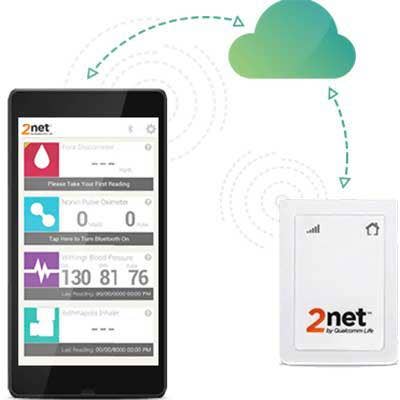
Qualcomm Life
Qualcomm's subsidiary, Qualcomm Life, has been developing chronic care management IoT solutions to enable continuous care and informed interventions for patients.
Through a collaboration with medical group Davita Healthcare Partners and health monitoring solution provider P2Link, Qualcomm Life's 2net Device Connectivity Platform is implemented into a coordinated care program for patients with heart failure – so they are equipped with a home blood pressure monitor, weight scale and tablet to collect and transmit biometric data into the cloud.
In 2015, Qualcomm Life also acquired Capsule Tech, a company that helps health-care facilities collect and process data from medical devices, to bolster its IoT segment.
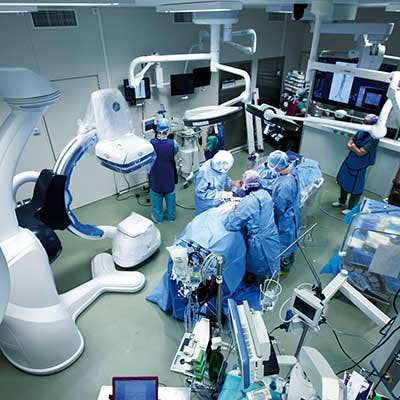
GE Healthcare
GE Healthcare's Hospital Operations Management platform leverages Internet of Things services to help hospitals become more efficient. The platform includes a variety of services, including tracking patient flow in real time to decrease wait time, as well as data acuity-based staffing and streamlining staff scheduling with analytics.
GE Healthcare says its Asset Management service can help hospitals achieve up to 8 percent additional operational savings and cost avoidance by redeploying underutilized assets and eliminating obsolete and excessive inventory.
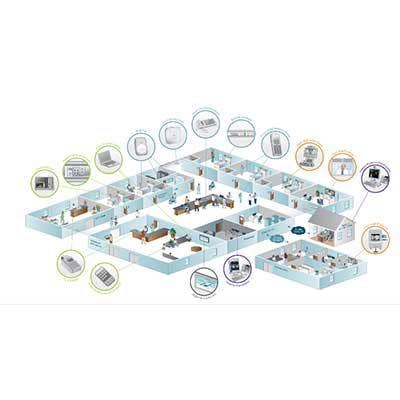
Cisco Systems
Cisco uses its IoT technology, as well as data virtualization software and high-performing infrastructure systems, to offer connected life sciences solutions.
The company's services are based on its Medical-Grade Network, which enables biomedical devices to operate interactively. With these services, hospitals and pharmacies can improve their operations by simplifying network management and support processes, as well as receive predictive actionable insight to pre-empt potential network issues.
Cisco technology also helps hospitals track staff through gathering data around collaboration and communication processes and analyzing this data.
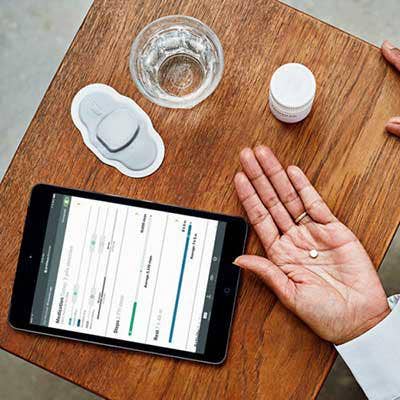
Proteus Digital Health
Proteus Digital Health says its Discover is the world's first digital medicine service. Discover tracks when patients take their pills by following sensors that are actually on the medication.
The patient activates Discover by taking medication with the ingestible sensor. Once the sensor reaches the stomach, it transmits a signal to the patch, worn around the patient's torso. The patch then sends digital records to the mobile device and to the Proteus cloud, so health-care providers and caregivers can access it. With Discover, doctors can track patient health patterns and medication treatment effectiveness.
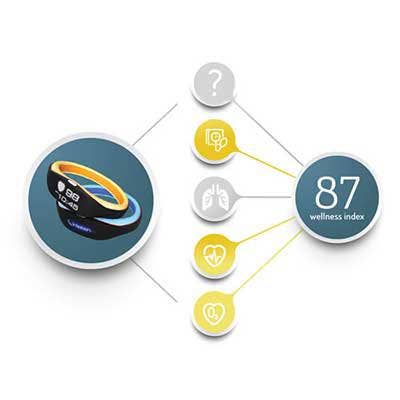
PhysIQ
PhysIQ's personalized health data analytics platform enables medical professionals to better monitor their patients so they can detect if they are in need of medical treatment.
The connected solution uses a chest strap to communicate with a phone, as well as PhysIQ's personalized physiology analytics technology to track small changes in patients' vital signs, like blood pressure and heart rate. With this solution, doctors can better manage patients with a chronic illness, as well as help consumers track their own health levels.
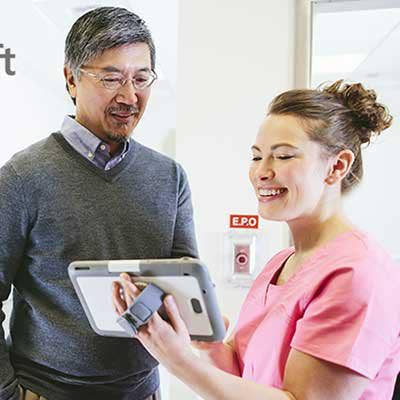
Microsoft
Microsoft's Azure IoT services enables better patient care, better access and lower costs for health organizations. Its Azure platform includes advanced analytics tools and a cloud platform to manage and track connected devices.
For instance, the company worked with Great River Medical Center to build an automated end-to-end medication management system. Microsoft connected devices and data to back-end systems that manage inventory, and medical and billing records. With this solution, the hospital could cut medication delivery by two-thirds, according to Microsoft.
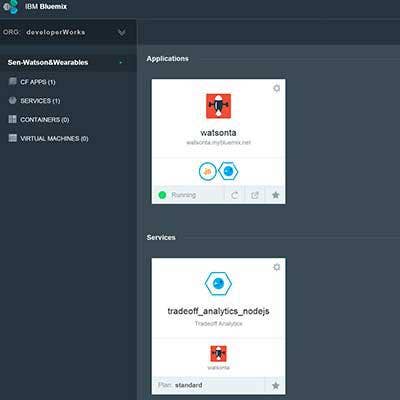
IBM
IBM's Watson IoT platform in Bluemix can securely transmit data from heart-monitoring devices to an on-premise health-care system.
Through this solution, patients can track heart-monitoring data, which is then transmitted to the Bluemix Secure Gateway service to connect to the IBM Integration Bus Healthcare Pack. Finally, the bus transforms these messages and stores them in an enterprise data repository.
Over the years, IBM has also inked various partnerships to bolster its IoT health segment, including a partnership with Medtronic to create IoT-enabled medical devices; as well as a partnership with Apple to integrate Watson into ResearchKit and HealthKit, enabling the collection of personal data for use in clinical trials.
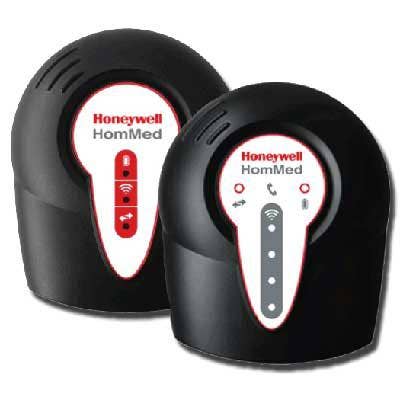
Honeywell Care Solutions
Honeywell Care Solutions' Seymour platform enables customers to pull together health data from several sources, including blood pressure cuffs, glucometers and fitness trackers. This platform helps health-care providers track trends and changes in patients' health beyond the hospitals walls.
According to Honeywell, Seymour will initially be provided to patients following events like surgery or chronic illness diagnosis to enable long-term health management. Seymour also leverages the Android OS and offers customers customized care plans.